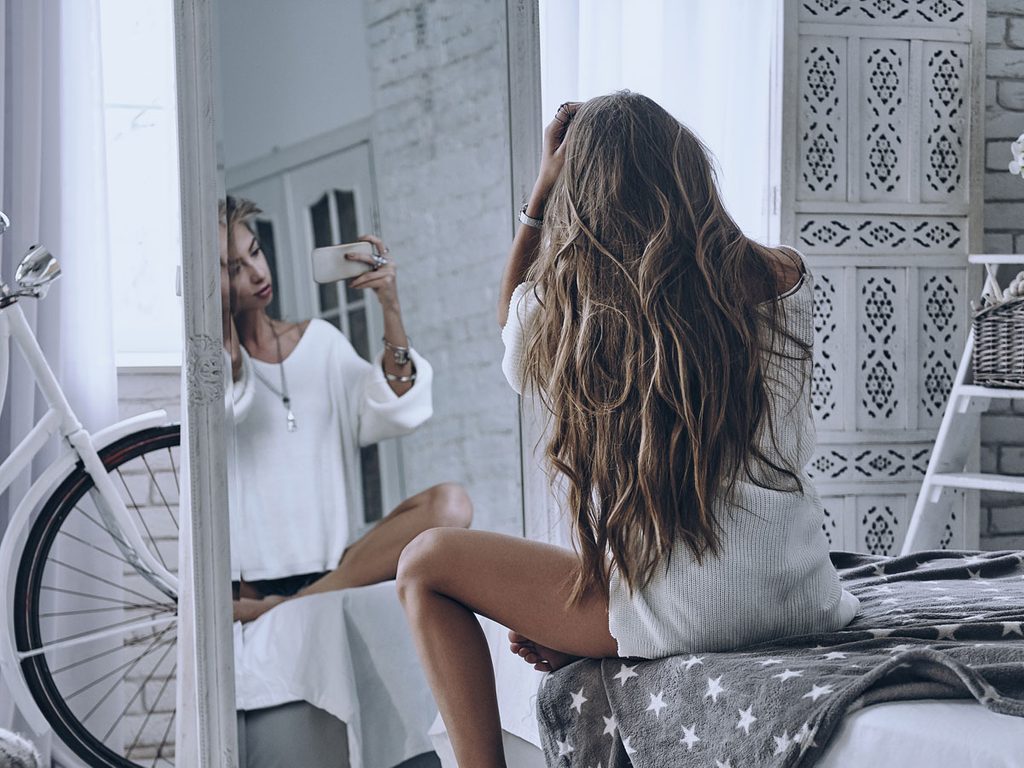Instagram’s Filter Ban and Why We’re So Obsessed With Our Faux Selves

Here’s what social media is doing to the self-esteem of young girls and what we all can do to cultivate a healthy self-image.
Cosmetic surgery has become a desired means for enhancing one’s appearance. So much so that Americans spent nearly 8.4 billion dollars on cosmetic procedures in 2018, according to The American Society for Aesthetic Plastic Surgery (ASAPS). Another stat that isn’t fabricated: Based on ASAPS’s findings, Botulinum Toxin (Botox) injections were ranked as the top nonsurgical aesthetic procedure that same year for plastic surgeons, with a 36 percent increase since 2014.
Dr. Stephen Mulholland, a practising cosmetic surgeon of 25 years at SpaMedica in Toronto, did a little research of his own after noticing a steady increase in young women desiring cosmetic procedures over the years. “I analyzed my botox data about a year ago and the average age of first-time botox in my practice has gone down 10 years in 10 years,” he says, adding the presumed reason why: prophylactic aging. “Millennials are simply not wanting to show any signs of aging; they want to stop it in its tracks.” And, it’s no wonder…
Cosmetic surgery is often viewed today as more of a “simple” beauty treatment, thanks to the Kardashian/Jenner clan, who have clouted their own cosmetic procedures for years on Instagram. It has become the outlet for iconification of their look, says Dr. Mulholland. “They are the ultimate users of filters in creating unrealistic images of themselves that aren’t actually real,” he says. “The problem is young women using the filters think, ‘If I can do this on my phone, a plastic surgeon can surely do it.'”
But are social media platforms, like Instagram, the motivation behind a young woman’s desire for cosmetic surgery?
Research confirms: A recent study published in Current Psychology found that women aged 18-29 were more likely to undergo cosmetic surgery if they spent a significant amount of time on social media, increasing from 17.2 percent in 2014 to 18.2 percent in 2017. The same study even uncovered Instagram as one of the most detrimental social media platforms for young women’s mental health, saying it can be harmful “to their psychosocial functioning, such as lowered self-esteem and increased risk of depression and anxiety.”
Up until recently, Instagram’s Effects Gallery was filled with augmented reality (AR) face filters which emulated cosmetic procedures, i.e., exaggerated pouty lips, narrow nose, lifted eyes, wrinkle-free skin and so on. But due to concerns that these filters were harming (young) people’s mental health, on October 18, the company behind Instagram’s AR face filter feature, Spark AR, announced a ban on all filters that portray cosmetic surgery.

“I was quite pleased to see that Instagram banned the use of pre- and post-op filters,” says Dr. Mulholland. The trouble is, these rampant use of filters are creating a faux sense of beauty that’s not even surgically possible. “It’s quite unrealistic expectations—and if not, flagrant fraud to position something that can’t be achieved surgically,” he says. Yet, young patients continue to show up to consultations with every intention of looking like filtered images of themselves that they’ve assembled on social media apps, like Instagram. (Do you have a healthy body image? Take this quiz to find out.)
While being transparent on what can be achieved surgically is crucial during a consultation with a patient, Dr. Mulholland also recognizes how devastating it is for young women when they finally comprehend that the “look” they desire can never fully be achieved. For example, “they’ll want to change their skin tone—and of course these filters enhance your skin tone amazing,” he says. But the reality is “we can only enhance the skin you’ve got; we can’t give you a whole new surface of skin.” It’s examples like this that prove Dr. Mulholland’s theory right: Instagram is the photo-driven Pinterest of aesthetic medicine.
So what gives? Why does viewing images of women who have undergone cosmetic enhancements increase a young woman’s desire for cosmetic surgery?
The theory behind the desire to look like your filtered version
Be as it may, we judge our own appearance based on the beauty standards that are defined by our society. Meaning, that we’re constantly comparing ourselves to others—especially when we’re scrolling through our Instagram feed. According to Dr. Katelyn Gomes, a clinical psychologist with CBT Associates, this corresponds well with the social comparison theory: “People compare themselves upwardly (i.e., to those they perceive as somehow faring better), laterally (i.e., to those they perceive as somehow faring similarly) or downwardly (i.e., to those they perceive as somehow faring worse).” However, “exposure to social media portraying unrealistic, unattainable, and altered physiques can encourage upward social comparisons,” she explains. This results in greater body dissatisfaction, which research shows to be one of the key motivational factors in a young woman’s desire for cosmetic surgery.
How to cultivate a healthy self-image
So, how can we learn to stop criticizing the reflection staring back at us in our selfies? Dr. Gomes recommends working on your self-image. First, she advises examining your judgemental language: “My nose is huge and crooked while her nose is cute and feminine.” Then, try to change that inner dialogue to more of an objective self description: “There is a small bump on the bridge of my nose and her nose is pointed up.” You can also improve your self-image by learning to broaden the basis of your self-worth to include non-appearance factors such as, skills, achievements and moral values, says Dr. Gomes. “It can also be helpful to perceive your entire body from head-to-toe instead of only focusing on smaller parts and details.”
Although these are just a few tips to help improve your self-image, you may want to check out these other tips to have a healthier relationship with your body.




